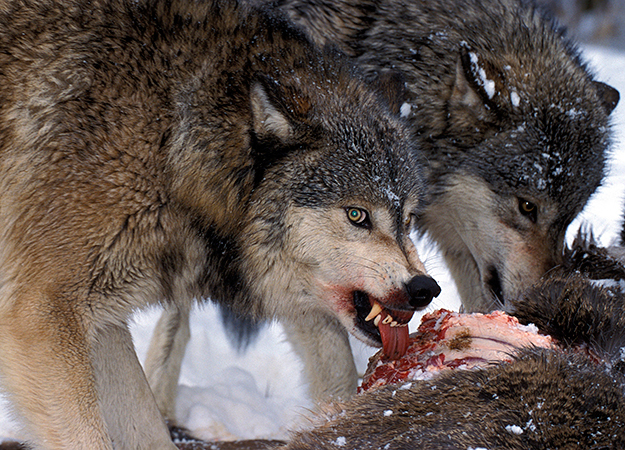Finally, the last section of this bill seeks to empower the States to manage their individual gray wolf populations by directing the Secretary to issue a rule to delist the gray wolf in each of the 48 contiguous States and the District of Columbia.
Introduction by Editor
Sean Duffy, a Republican Representative from Wisconsin’s 7th District, introduced the “Manage our Wolves Act” in response to a deluge of lawsuits brought by radical environmentalist groups hoping to keep the gray wolf, whose problematic populations are thriving in several regions of the country, on the Endangered Species list forever.
The bill was debated in Congress on Wednesday, November 14 and will go before the full House on the 16th. Background and the actual language of the bill in its current form are below. Emphasis added.
The Committee on Natural Resources, to whom was referred the bill (H.R. 6784) to provide for removal of the gray wolf in the contiguous 48 States from the List of Endangered and Threatened Wildlife published under the Endangered Species Act of 1973, having considered the same, report favorably thereon without amendment and recommend that the bill do pass.
PURPOSE OF THE BILL
The purpose of H.R. 6784 is to provide for the removal of the gray wolf in the contiguous 48 States from the List of Endangered and Threatened Wildlife published under the Endangered Species Act of 1973.
BACKGROUND AND NEED FOR LEGISLATION
H.R. 6784 is a bipartisan bill that would exempt from judicial review the 2012 rule (later reinstated in 2017) delisting of the gray wolf (canis lupus irremotus) in Wyoming under the Endangered Species Act of 1973. The bill further directs the Secretary of the Interior to reissue a 2011 rule to delist the gray wolf in the Western Great Lakes region and would exempt this rule from judicial review. Finally, the bill directs the Secretary to issue a rule to remove the gray wolf (Canis lupus) in each of the 48 contiguous States from the list of Endangered and Threatened Wildlife and prohibits judicial review of this action.
Gray wolves were first listed as endangered under the Endangered Species Act of 1973 (ESA, 16 U.S.C. 1531 et seq.) in 1974. Existing wolves present in the Western Great Lakes region at the time were protected, and the federal government subsequently introduced the species to the western U.S. by relocating wolves from Canada and releasing them in central Idaho and Yellowstone National Park in 1994 and 1995. States, local citizens, livestock groups, and sportsmen mostly opposed the reintroduction effort. The reintroduced wolf population in the West expanded more quickly than many had anticipated. As a result, in September 2001, affected States and tribes began working with the U.S. Fish and Wildlife Service (FWS) to formulate plans that would effectively transition management responsibility of the species to the States upon delisting under the ESA. FWS deemed the Idaho and Montana wolf management plans adequate, but did not approve the Wyoming plan.
Gray wolves were removed from the endangered species list on January 14, 2009. As part of their management plans, Idaho and Montana conducted tightly controlled wolf hunts beginning in the autumn of 2009. Sales of wolf hunt tags traditionally provide funding for wildlife management activities, and hunts are conducted in a similar fashion to those of large ungulates and other wild animals under State management.
Activist groups challenged the FWS decision to delist the wolves in Idaho, Montana, and the Western Great Lakes, arguing that the rule had been politically motivated and did not comply with certain provisions of the ESA. The U.S. District Court for the District of Montana held that the rule was a ‘‘political solution that does not comply with ESA’’ and that delisting of a species which was still endangered in a portion of its historic range (Wyoming) was not appropriate. The delisting of the wolves was halted in all States until the Wyoming plan was acceptable to FWS.
Congressman Michael K. Simpson (R–ID) and Senator Jon Tester (D–MT) sponsored a provision in the Fiscal Year 2012 Consolidated Appropriations bill clarifying Congressional intent to remove the recovered wolves in Idaho and Montana from the endangered species list, and return the species to State management. Provisions to delist the wolf and allow States to retain management authority have been included in appropriations acts each successive year. Populations of gray wolves present in the Western Great Lakes increased in number through the 1990s and 2000s. FWS delisted wolves in Minnesota, Wisconsin, and Michigan in a new rule in 2011. Wyoming wolves were delisted by FWS in 2012. Wolves in Wyoming and in the Western Great Lakes region were, however, re-listed in 2014 due to additional court decisions that challenged the adequacy of State management plans.
The D.C. Circuit Court of Appeals reversed the 2014 decision on March 3, 2017, regarding gray wolves in Wyoming only. FWS published a final rule delisting them in accordance with the court order on May 1, 2017, and Wyoming wolves are again managed by the State of Wyoming. As such, this bill would safeguard the FWS’ delisting decision from litigious groups’ lawsuits by exempting this delisting from judicial review. On August 1, 2017, the D.C. Circuit Court of Appeals issued a ruling upholding a U.S. District Court order overruling FWS’ determination that the wolves had sufficiently recovered within the Western Great Lakes region. This bill would direct the Secretary of the Interior to reissue the rule to delist the gray wolf in the Western Great Lakes region and exempt this rule from judicial review to prevent continued litigation.
Finally, the last section of this bill seeks to empower the States to manage their individual gray wolf populations by directing the Secretary to issue a rule to delist the gray wolf in each of the 48 contiguous States and the District of Columbia. To ensure that States are provided certainty when developing State management plans, this bill would also exempt this delisting decision from judicial review.
The gray wolf delisting issue is not a new one for Congress and has been bipartisan. As mentioned above, appropriations riders affecting the gray wolf have been enacted since 2012. In the 112th Congress, Congressman Denny Rehberg (R–MT) introduced H.R. 509, Congresswoman Candice Miller (R–MI) introduced H.R. 1819, Senator Orrin Hatch (R–UT) introduced S. 249 and Senator Max Baucus (D–MT) introduced S. 321—all affected gray wolves. In the 114th Congress, Congressman Reid J. Ribble (R–WI) introduced a similar bill, and Senator Ron Johnson (R–WI) introduced S. 2281. The Department of the Interior, Environment and Related Agencies Appropriations Act, 2017 (H.R. 5538) included a provision to prohibit the use of federal funds to list the gray wolf under the ESA in the lower 48 States after June 13, 2017. Also during the 114th Congress, the House passed the SHARE Act (H.R. 2406) in February 2016, which included the directive to reissue gray wolf rules for the Western Great Lakes and Wyoming. The wolf provisions from the SHARE Act were also included in the House amendment to the North American Energy Security and Infrastructure Act of 2016 (S. 2012). In the 115th Congress, Congressman Collin Peterson (D–MN) introduced a gray wolf bill (H.R. 424); the Natural Resources Committee reported the bill favorably on January 8, 2018.22 Senator Ron Johnson (R–WI) also introduced a gray wolf bill, S. 164, this Congress.
The “Manage our Wolves Act”
Union Calendar No. 791
115th CONGRESS
2d Session
H. R. 6784
[Report No. 115–1012]
IN THE HOUSE OF REPRESENTATIVES
September 12, 2018
Mr. Duffy (for himself, Mr. Newhouse, Mrs. McMorris Rodgers, and Mr. Peterson) introduced the following bill; which was referred to the Committee on Natural Resources
November 9, 2018
Committed to the Committee of the Whole House on the State of the Union and ordered to be printed
For text of introduced bill, see copy of bill as introduced on September 12, 2018
A BILL
To provide for removal of the gray wolf in the contiguous 48 States from the List of Endangered and Threatened Wildlife published under the Endangered Species Act of 1973.
Short title
This Act may be cited as the Manage our Wolves Act
.
Removal of Federal protections for gray wolves in Wyoming and Western Great Lakes
gray wolves in Wyoming
The final rule published on September 10, 2012 (77 Fed. Reg. 55530), that was reinstated on March 3, 2017, by the decision of the U.S. Court of Appeals for the District of Columbia (No. 14–5300) and further republished on May 1, 2017 (82 Fed. Reg. 20284), that reinstates the removal of Federal protections for the gray wolf in Wyoming under the Endangered Species Act of 1973 (16 U.S.C. 1531 et seq.), and this subsection, shall not be subject to judicial review.
gray wolves in Western Great Lakes
Before the end of the 60-day period beginning on the date of enactment of this Act, the Secretary of the Interior shall reissue the final rule published on December 28, 2011 (76 Fed. Reg. 81666), without regard to any other provision of statute or regulation that applies to issuance of such rule. Such reissuance (including this subsection) shall not be subject to judicial review.
Removal of Federal protections for gray wolves range-wide
In general
Not later than the end of fiscal year 2019, and except as provided in subsection (b), the Secretary of the Interior shall issue a rule to remove the gray wolf (Canis lupus) in each of the 48 contiguous States of the United States and the District of Columbia from the List of Endangered and Threatened Wildlife in section 17.11 of title 50, Code of Federal Regulations, without regard to any other provision of statute or regulation that applies to issuance of such rule.
limitation on judicial review
Such issuance (including this section)—
shall not be subject to judicial review; and
shall not affect the inclusion of the subspecies classified as the Mexican gray wolf (Canis lupus baileyi) of the species gray wolf (Canis lupus) in such list.
Read the text of the bill here
Free Range Report
Thank you for reading our latest report, but before you go…
Our loyalty is to the truth and to YOU, our readers!
We respect your reading experience, and have refrained from putting up a paywall and obnoxious advertisements, which means that we get by on small donations from people like you. We’re not asking for much, but any amount that you can give goes a long way to securing a better future for the people who make America great.
[paypal_donation_button]
For as little as $1 you can support Free Range Report, and it takes only a moment.



